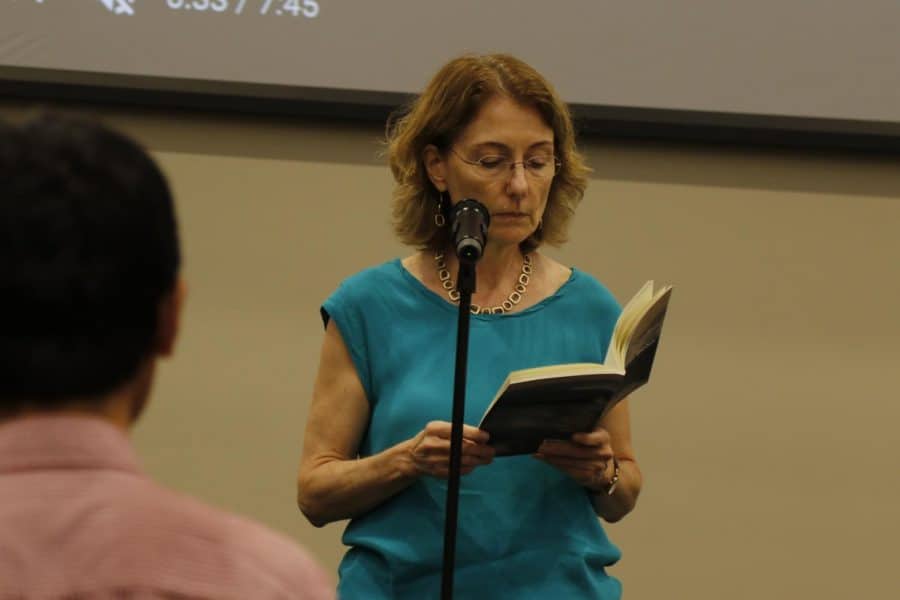Poets take influence from the world at reading
October 1, 2018
Walking to the front of the room with a photo of trash projected on the stage behind her, Heidi Lynn Staples was the first poet to perform at the poetry reading hosted by UA’s creative writing program.
Before she read her first poem, Staples said the photo behind her was a trash mass from Lake Guntersville. This inspired the first poem she read, titled “The Manager.”
Staples performed work from her newest collection titled “A**A*A*A.” The collection focused on the natural world and the subsequent effect of man on the natural landscape.
A project she is working on involves writing poems from words she finds off of things people have thrown away. She shared a poem that used words from an old Luna Bar wrapper. Effects of waste in the environment was a common theme throughout Staples’ poetry.
Coming to Alabama five years ago, Staples immersed herself in the Alabama landscape and was surprised to find a stark contrast between preservation efforts and excess waste sights. Staples describes several camping trips she took with her daughter as well as word games she used to play with her and how it inspired the poems she read.
“I really liked the poem about her daughter,” said Alexa Baisch, a freshman majoring in business management. “I am here for a creative writing class, and I am very surprised by how much I enjoyed them.”
Both poets who performed are UA faculty members that teach in the creative writing program, the other being Robin Behn. Behn’s advice to students interested in writing or performing poetry is to take an undergraduate creative writing class.
“Read as much as you write and immerse yourself in the world of poetry,” Behn said. “Don’t be afraid to write about your obsession. I’m obsessed with music so that’s what I write about. Write about the things that stay with you.”
Music heavily influenced Behn’s performance of her poetry. Behn’s background in the flute and interest in Irish fiddle tunes manifested in her poetry performance. Behn describes how she can hear the poem in her head before she writes the words.
“I hear the rhythms of it, the phrasing and the sound of it, and then the words come,” Behn said.
The first poem Behn read was titled “Two Rivers.” The performance incorporated both the playing of flute and the reading of the poem. Behn labelled it a “poem sandwich” as she played a tune on her flute, read the poem and then concluded it by playing the same tune again.
“I thought they were interesting and an unexpected melding of music and poetry that had a desirable effect,” said Nick Therell, a junior majoring political science. “I did think of the music when she performed her poem after and thought it worked together well.”
Behn is the author of five volumes of poetry including “Quarry Cross Poems,” her latest collection which includes the poem shared during her reading.
Behn describes how performing poetry requires taking a leap of faith.
“Art is not the same thing as regular old life,” Behn said. “Give yourself permission to enter into a space that is art, and take a leap of faith that the audience wants to go there with you.”








